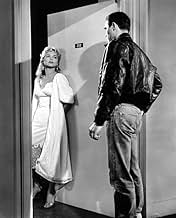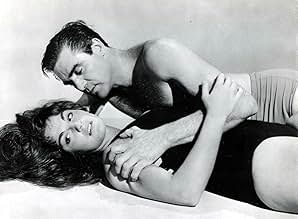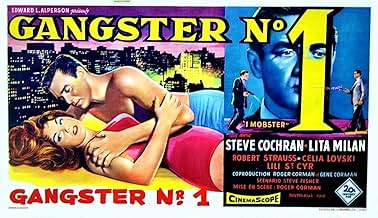The rise and fall of gang lord Joe Sante.The rise and fall of gang lord Joe Sante.The rise and fall of gang lord Joe Sante.
- Labor Union Boss
- (uncredited)
- Police Officer
- (uncredited)
- Eve
- (uncredited)
- Senator at Hearing
- (uncredited)
- Mr. Stephens
- (uncredited)
- Waiter
- (uncredited)
- Director
- Writers
- All cast & crew
- Production, box office & more at IMDbPro
Featured reviews
Sante's constant companion is Blackie (the affable Robert Strauss whose aging is suggested by hair frosting), first Joe's mentor while a boy, then his immediate superior, then his immediate subordinate and finally his trusted friend who does him in. Strauss had his chance to shore up if not carry the film, but his lackluster role got in the way due in great measure to uninspired direction.
The film assumes an air of self-importance, epic and biographical in concept and presented in Cinemascope, but never rises above a low grade "B" picture in any aspect. While it pretends to be a fascinating study of a hoodlum's life, it plods along like a routine stage drama. The only Noir element is Joe's seemingly conflicted character headed toward a fatalistic end. Joe is represented as a decent sort, supporting his mother (who accepts his largesse and then ultimately disowns him), keeping needy acquaintances on the payroll and even turning down gratuitous trysts with wanton floozies. He never betrays a friend, and kills people only when he absolutely must. We would be persuaded that Joe is really not a bad guy.
Corman's direction shows his simplistic style, but without the sight gags or wacky characters found in "Little Shop of Horrors" or "Bucket of Blood". The plot is forced, the script flat and the same blaring jazz soundtrack later used in "Shop" and "Bucket" is offered for suspense. Completely devoid of imagination, suspense, humor, interesting camera work or real empathy for any of the characters, the story lopes along until its inevitable, predictable conclusion.
Sorry Roger, suspense and schlock are two different concepts. You were in way over your head on this one.
Many of these books have now been filmed by the likes of Truffaut (SHOOT THE PIANO PLAYER from Goodis' DOWN THERE) Cornfield (THE 3RD VOICE from Williams' ALL THE WAY) and others -- Jim Thompson most frequently --but as far as I can tell, Roger Corman's I, MOBSTER was the first, from an "anonymous" Gold Medal Original, I, MOBSTER, published in 1951.
Can anyone find an earlier?
Joe Sante (Cochran) is brought before a Senate committee on organized crime and pleads the Fifth to every question. He then reflects back on his life and the rise he saw in the New York crime scene from his time as a boy to muscling his way to complete control. Along for the ride is his friend, Black Frankie (Robert Strauss), a couple of years older than Joe. They work in the organization run by Paul Moran (Grant Withers). Joe's chosen profession rubs his parents the wrong way, his mother (Celia Lovsky) lying to herself about what he's doing while his father (John Mylong) can see right through the thin lies.
This film is, at best, a generic mobster movie. Joe works hard, gets in with the boss, has a great idea and implements it, has a girl who doesn't like his work but sticks with him through and through. There are some little variations that provide some interest, mostly around the girl, Teresa (Lita Milan), a girl from the neighborhood that Joe has a dance with the night he gets arrested and put in jail for a year. She's faithful to him despite hating his line of work, keeping by his side despite not being his girl for years. Her eventual fall into his arms is the best part of the film and is owed entirely to Milan's performance. She's dedicated, and Corman gives her space.
My problems with the film can centrally be placed on Joe's effort to make himself into a big player in the mob. He decides that he's going to enter the labor/management dispute as an outside labor negotiator, pitting both sides against the middle, he says. The problem is that this is the kind of thing in a dramatic narrative that needs particular attention, filled with specific details about what made him successful. All we get is two meetings with managers in different places, one that works and another that doesn't, that relies on just a bit of dialogue. There's no work on his part. Instead of seeing that, we get stock footage montage with Joe's face double exposed over it. That's it. We actually spend more time watching Lili St. Cyr's striptease (in tight closeup of her face) than this important plot and dramatic point of Joe becoming important to the mob.
And that's where my disappointment comes from. Corman, given a real budget of half a million dollars and access to Fox's resources couldn't do more than what seems like quickly filming a first draft script from Steve Fisher. Corman's production processes, for the first time, feel like an active impediment to him as a filmmaker. It's not that his production processes were great in the tiny budget world of things like Not of This Earth, he could always have used a rewrite, but, with a real budget, he couldn't have funded another week of writing to get some more meat on the script's bones?
And so the final product, a real movie with real money at a real studio and he treats it like something he needs to make in five days before his money runs out. It's at this point where it feels like Corman might have shorn any effort at being an artist, at least implicitly. His production process was more important than the end product. He could hide that when working on tiny budgets, but with a real one, and his efforts are the same? That's a real disappointment.
I will say, though, that the film does look good. I mean, this was his first film done in scope, but I couldn't find a copy in scope. Everything was Academy online (apparently the DVD is in scope, but I didn't have the impulse to buy it). So, it's awkwardly Panned and Scanned, but it really does feel like Corman effectively used the whole frame, reminding more of Kurosawa's first attempt at widescreen images in The Hidden Fortress than John Ford's center-framing in The Long Gray Line.
I mean, this film isn't bad. It's just kind of bleh. It's thin, decently acted, but goes nowhere particularly interesting. It functions well enough to survive on screen for 80 minutes as part of a double bill in the late 50s, but that's about it.
** 1/2 (out of 4)
Joe Sante (Steve Cochran) grew up poor as a child due to his immigrant parents but he plans on much bigger things. He ends up working for a gangster as a young age and quickly rises to the top but once on the top he realizes that there's only one place left to go. This Corman production will never be confused with the greatest gangster pictures out there but there are enough nice touches to make it worth viewing. What I enjoyed most was the style of the film, which might cause some to think of Martin Scorsese's GOODFELLAS because both films start off with a young kid and we see him through the ups and downs of the business. I thought this film did a very good job at showing how some of these lower-level thugs worked and Corman certainly handled the material with ease. Some of the best moments happens towards the start of the picture as Joe starts to get more and more money, which doesn't sit well with his father because he knows what has to be going on in order to get this type of money. This continues with a very good sequence of Joe getting out of prison and being made an official member but first he must commit a crime to prove his loyalty. Corman gives the film a very fast and easy feel and some of this is due to the terrific score by Edward L. Alperson, Jr. and Gerald Fried. The Jazz music really adds a lot of heat and this is especially true during an extremely sexual striptease. Cochran makes for a good lead as he has no trouble making you believe he's this tough guy who will stop at nothing to get what he wants. Lita Milan steals the film as the woman he loves. She has a wide range of emotions to go through and she nails them perfectly. Also good are Robert Strauss as the man who brings Joe in and Celia Lovsky is good as his mother. Lili St. Cyr appears as herself and bombshell Yvette Vickers (ATTACK OF THE 50FT WOMAN) has a brief role. At 81-minutes the film has a pretty good pace from start to finish and as you can see the cast are in fine form. The biggest problem is that the screenplay really isn't doing anything we haven't seen countless times before and if you've at least seen one gangster flick in your life then you should see all the trappings here. With that said, I MOBSTER is a decent little "B" picture that fans of Corman will want to check out.
Did you know
- TriviaThis movie was banned in Sweden in 1961.
- Quotes
Mrs. Sante: Now I want to say goodbye to my son whenever I see again.
Joe Sante: Mom, you're talking crazy.
Mrs. Sante: Don't touch me.
Joe Sante: Mama, you're the only thing I have... You and Teresa are the only thing I have in the world.
Mrs. Sante: Don't ever come near me again.
Joe Sante: Mommy, you don't mean that.
Mrs. Sante: Yes, I mean it. I am so ashamed. I will go to my grave buried in your shame the way papa did. You did this to us, Joe. And we tried so hard to teach you when you very little. How we failed.
Joe Sante: No, mama, you haven't failed. I'll be fine. I'll be what you want me to be. You'll see. I promise you.
Mrs. Sante: Your promises mean nothing. In all your life there is somebody you have forgotten, Joe. And I have tried and tried to tell you.
Joe Sante: Who? Who have I forgotten?
Mrs. Sante: God.
- ConnectionsFeatured in Wishful Thinking (1997)
- SoundtracksLOST, LONELY AND LOOKING FOR LOVE
Music by Edward L. Alperson Jr.
Lyrics by Jerry Winn
Sung by Jeri Southern
Details
Box office
- Budget
- $500,000 (estimated)
- Runtime1 hour 21 minutes
- Color
- Aspect ratio
- 2.35 : 1
Contribute to this page





























